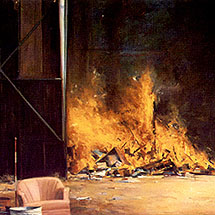| 9. Incinerators |
 |

| The destructive power of
fire is used in a controlled manner to eliminate waste.
Most of our rubbish is buried or burnt. When it is to
be burnt, the rubbish is taken to a giant oven called
an incinerator. Once inside, the rubbish is burnt until
only ash remains. It would appear that burning is a better
solution than burying rubbish, given that dumps occupy
a lot of space and can be focal points of toxins. Incinerating,
however, also has its problems. It is irreversible, meaning
that the burnt matter cannot be recovered. In addition,
when rubbish is burnt, two thirds of the matter is converted
into smoke that pollutes the air. The other third is converted
into ash, often toxic, which must be buried or stored. |


[ enlarge image ] |
 |
| Weighing. A conscientious thinker does not
remain indifferent or passive when the time comes to act, but is
prepared to defend what he or she considers to be valuable or important.
Weighing an action is like putting on a balance the advantages
and disadvantages of that action, and then acting according to
the criteria that one considers important. |
| Decide whether the type of actions described help
reduce waste in general and/or waste dangerous to the health of
living organisms: |
| 1. |
Avoiding unnecessary use of paper. |
| 2. |
Participating in selective collection of rubbish:
glass, plastics, paper, etc. |
| 3. |
Using throwaway cups. |
| 4. |
Using styrofoam. |
| 5. |
Buying things with packaging. |
| 6. |
Using aerosols. |
| 7. |
Using recycled paper. |
| 8. |
Using your own cloth bag for
the shopping. |
| 9. |
Throwing used batteries into
the rubbish. |
| 10. |
Pouring cooking oil down the
drain. |
| 11. |
Buying products in bulk. |
|
|
 |
 |
| Try to visit a working
incinerator. |
 |
| Find objects that are not
used or that are going to be thrown out: boxes, jars, tins, etc. Think
about ways they could be reused. |

 |
| © Grup IREF 2003, with the support of the European Commission, DG XXII (Socrates/Comenius 3.2) |
[ print ] |
|
|
|
|